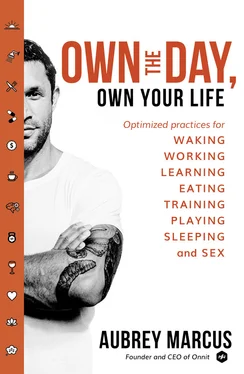Getting Owned
In the days before fuel-injected engines, if you lived in a cold-weather city in the wintertime, you couldn’t just hop in your car first thing in the morning, turn over the engine, throw it in gear, hammer the accelerator, and speed off into the rest of your day. If you tried, the car would be sluggish and perform haltingly at first, because the fluids that make the critical components of the engine function were not properly primed. If you persisted in speeding out of the driveway before the fluids were warm, you’d start to damage internal components, throwing off the engine’s timing, resulting in a hefty mechanic’s bill.
Even today, with fancy onboard computers, high-tech fuel injection, and all sorts of automotive bells and whistles, most experts will tell you that it’s not a bad idea to let your car warm up for thirty to sixty seconds and then take it easy for the first few miles, especially if you’re concerned with maximum performance and long-term durability.
Do you want to guess what proportion of people follow those fairly simple guidelines for warming up their vehicles? It’s about the same as those who properly warm up their bodies upon waking. As a society, we tend to be as rough on our bodies as we are on our cars, which is unfortunate, since, unlike cars, we can’t trade in our bodies for a newer model with lower mileage after twenty years of steady abuse. Instead of paying the mechanic, we pay the doctor—neither of which is a fun check to write.
A brief walk through the first hour of the average day should give you a good sense of what we’re talking about here. The first sensation most of us register when we wake up is thirst. If you’ve managed to sleep well, you’ve just gone seven-plus hours without drinking a drop of water. If you’re in a dry climate, worked out the previous afternoon, or partied hard the night before, you likely hit the pillow at a fluid deficit out of the gate. Depending on the temperature of your room and how many blankets you sleep under, you may have even accelerated the dehydration process through sweat. In combination, the vapor from respiration and perspiration can often amount to a pound of water lost overnight. As a result, we regularly wake up feeling like we’ve been nursing on a cotton ball.
You would think that the logical response to this condition would be to get up and drink some water, to lubricate all those critical internal components we need to fire correctly for our bodies to be most effective today and for the long haul. Instead, what most of us do is hide under the covers, hitting the snooze button like a snare drum until the last possible moment, at which point we hurry out of bed, strip our clothes off, step into the shower and pour an average of twenty scalding-hot gallons of water over our body, then dump three more quarts through a drip coffee maker. We rarely think to actually drink any of this water before it goes down the drain or through the filter, which is insane; if the physical sensations we experience when we wake up happened to us in the middle of our day, we’d say “Damn, I’m thirsty” and then crush a glass of water. Starting the day, though, it always ends with us holding a cup of coffee.
I have news for you: the best part of waking up is not coffee in your cup. But, Aubrey, I’m not myself without a cup of coffee in the mornings. I need it. No, you don’t. Waking up your body with coffee is like setting off a fire alarm as an alarm clock. When you’re dehydrated and have nothing in your stomach, the caffeine enters your bloodstream incredibly fast, releasing a flood of stress hormones from your adrenal glands that your body reads as a fight-or-flight trigger. Like you’ve been woken up being chased by a predatory cat. While this is effective in the short term, it’s generally a good rule of thumb to keep aggressive caffeine and feline doses to a minimum first thing in the morning. Drinking caffeine when you are dehydrated may feel good for the mouth, but you aren’t exactly digging out of the hole. The hydrating water in the coffee is somewhat offset by the dehydrating nature of caffeine. Yet we still reach for coffee in the morning, in large part because these adrenal effects are so damn good at dealing with the other problem we face when we wake up: we’re still tired .
Only one in seven people report waking up feeling refreshed after sleeping. Almost half of all Americans report feeling fatigued at least three times during the week. As a nation, Americans are owned and controlled by fatigue and the tools used to fight it. We are chronically tired because we are constantly screwing up our sleep. Sleepiness and energy levels are regulated by something called circadian rhythm, which tells your body when it’s time to wake up and when to sleep. You may have heard it referred to as your body clock or your internal clock. And contrary to popular practice, the hands of that internal clock are not powered by Starbucks. They are powered by sunlight and movement. So when you shuffle your feet around a dimly lit house with your comfy robe on, your body can’t tell if you are awake, asleep, or skinwalking as a cave bear. By restricting those important cues that signal the start of a circadian cycle on a regular basis, your entire body gets thrown out of whack. When you add dehydration to the equation, things only get worse. That’s why, despite our best intentions, we so often don’t feel like working out, our brains are in a fog, we suffer from headaches, and we’re generally on edge and just plain tired. Really tired. Except when it comes time to go to sleep, of course, because then, miraculously, despite being tired all day, we can’t sleep. Sound like anyone you know? If not, you need more friends, because the CDC estimates that between 50 and 70 million Americans have a sleep disorder. You have to know at least one of those people!
There are studies on both men and women showing that even mild dehydration resulting from fluid loss equaling roughly 1 percent of your body weight can cause headaches, moodiness, irritability, anxiety, and fatigue. Decreases in mental performance and short-term memory loss can start at as little as a 2 percent loss in water. You ever find yourself being 1 or 2 percent lighter in the morning than before bed? That is enough. And for reference, mixed martial arts fighters commonly cut up to 10 percent of their body weight before a fight. No wonder they are always yelling and pointing at each other in their underwear on weigh-in day! When you consider that 78 percent of Americans are chronically dehydrated, based on their water intake, that does not paint a pretty picture of the start of the average day. It paints a picture of us getting royally owned.
But it isn’t just the water itself that is the problem. We lose electrolytes and minerals over the course of our sleep as well. Minerals are key to modulating and supporting numerous body processes, from the muscles to the organs and even the brain. Without adequate minerals, many of the body’s normal functions start to diminish. Well, guess what, we are just as bad at replacing our minerals on a regular basis as we are at getting ourselves moving and into the sunlight to start our days.
There is a solution to all that: a three-part formula that involves a simple morning mineral cocktail for hydration and adds a little bit of sunlight and a little bit of movement to reset your internal clock, taking you from getting owned to owning it within the first twenty minutes of your day. I’ve tested it, the athletes and high performers I work with have confirmed it, and clinical research has proven it: hydration and circadian balance are the essential ingredients to the consistent perfect wake-up. The formula I am going to walk you through now, then, is about mastering the levels of these essential ingredients so that the morning sets you up for owning the day every time.
Читать дальше












